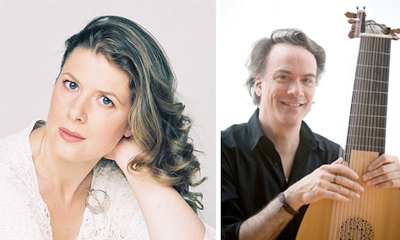by Timothy Robson

There was a full house for this “preview performance” on a warm but not stifling evening (large doors at either end of the barn were open for ventilation). The performance began in full daylight; by the end, the last stage of dusk had enveloped the barn in darkness.
Soprano Meredith Hall, a native of Newfoundland, was both the star of the show and its guest co-director, along with Bergeron. Instrumentalists from Apollo’s Fire and Bergeron’s Ensemble La Nef — including Susanna Perry Gilmore, fiddle; Kathie Stewart, flutes and whistles; Tina Bergmann, hammered dulcimer; Betsy MacMillan, viola da gamba; Robin Grenon, harp; and Patrick Graham, percussion — formed the lively and imaginative backup band.
Newfoundland stands at the eastern edge of Canada, remote and barren with 10,000 miles of rocky coastline. Originally settled by the Irish, Scots, Welsh, French, and British, Newfoundland did not become a part of Canada until 1949, after rejecting a proposal to become a protectorate of the United States. Newfoundland’s isolation helped form its own regional identity, a unique culture bred of Celtic, French, and English influences.
Hall noted in her affectionate program notes that the people of Newfoundland have been looked upon as the “hillbillies” of Canada. But just as the culture of Appalachia is complex and sophisticated in its own way, so too are the songs, instrumental music, and stories of Newfoundland. Meredith Hall’s love for the music and culture of her homeland was obvious throughout the performance.
The songs focused on universal themes: love lost, love found, magic, and the hard life of a rural and fishing society. Although many of the songs were native to Newfoundland, some traditional Irish instrumentals were incorporated into the program. The arrangements were mostly by Hall and Bergeron, although a fair amount of collaborative improvisation probably went into the final performed versions.
The program was so rich that only a few highlights can be mentioned here. Robin Grenon’s harp was the perfect foil for Meredith Hall’s light, expressive soprano in I Will Hang My Harp on a Willow Tree, which uses words from the 1850s but was given a new tune when it made its way to Newfoundland. The Saucy Sailor (a dialogue between “He” and “She”) gave percussionist Patrick Graham his moment to shine. He played an instrument concocted from what appeared to be a string mop. The mop head was decorated with a skull, and the strings were the skull’s “hair.” Other sound-making devices were attached to the mop handle, and Graham pounded the whole apparatus on a box to create the beat for the song.
Our Ship She Is Ready to Sail Away wistfully depicts Irish immigrants leaving their homeland for a new life in Newfoundland. The modal tune was followed by two rousing Irish dance tunes. At several points in the program, Meredith Hall gave recitations of poetry and stories from her homeland, one of them performed in the local dialect.
A hallmark of Apollo’s Fire’s own productions is the seamless integration of one part of the program into the next, creating a theatrical whole. That was missing in “My Island Home,” leading to some awkward transitions, and applause that interrupted the flow of the show. There is nothing intrinsically bad about a “traditional concert approach,” but here it failed to take full advantage of the atmospheric music and the venue, slowing the progress of the performance.
Meredith Hall is a talented performer, yet at times she worked too hard to project the music through her body gestures. Subtlety of physical expression might have been even more effective.
It was a revelation to hear her give a recitation in dialect, and it would have been fascinating to hear her sing in that dialect, especially since the full texts of the songs were printed in the program.
Because a beautiful sameness stretched over the concert’s 90-minute duration, Hall might also have considered a more radical vocal approach — leaving behind the purity of her classical voice, lowering the keys, and throwing the weight of her chest voice into some of these songs. That could have produced a more dramatic and compelling effect, reflecting the troubling nature of some of the texts.
But this was a preview of “My Island Home,” and logistics will likely be smoothed out in succeeding performances. As a show, it has much to offer, with the potential to rival the success of Apollo’s Fire’s own crossover creations.
Published on ClevelandClassical.com June 21, 2016. Revised June 22.
Click here for a printable copy of this article



